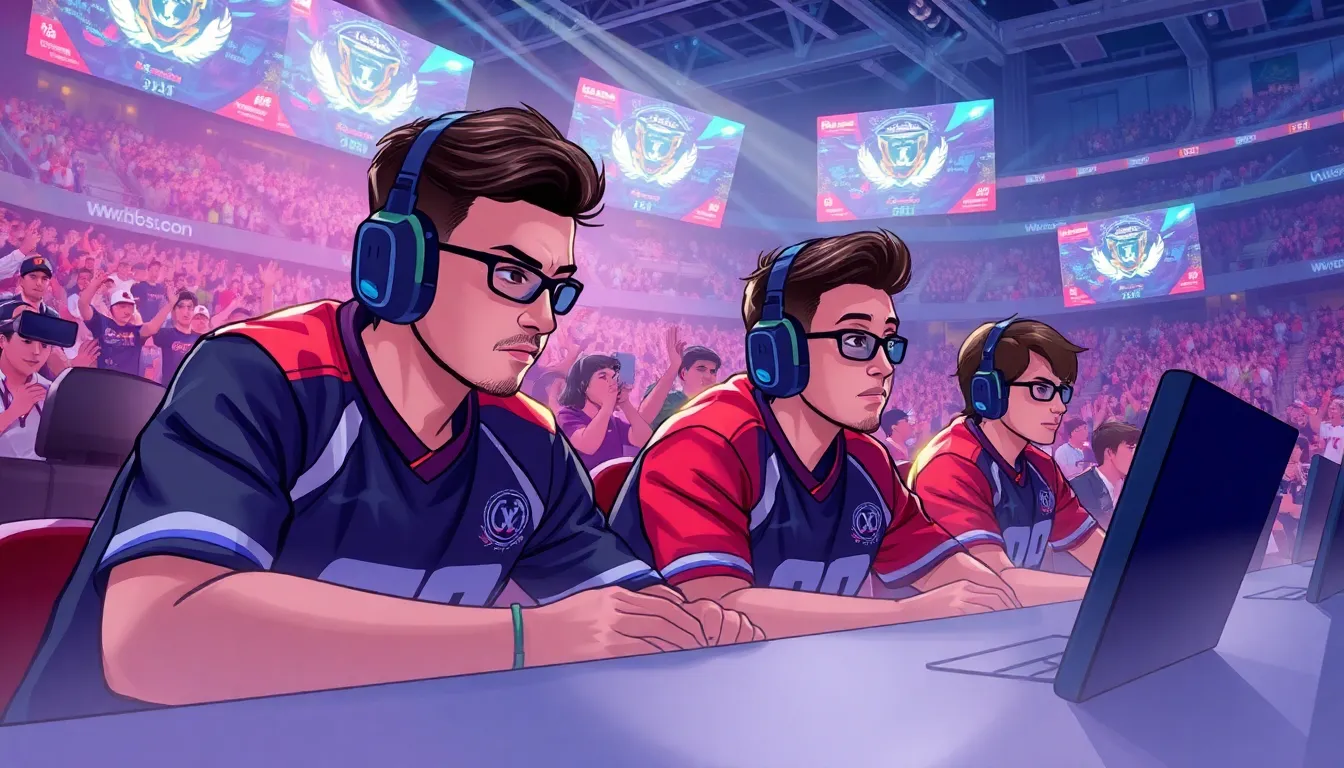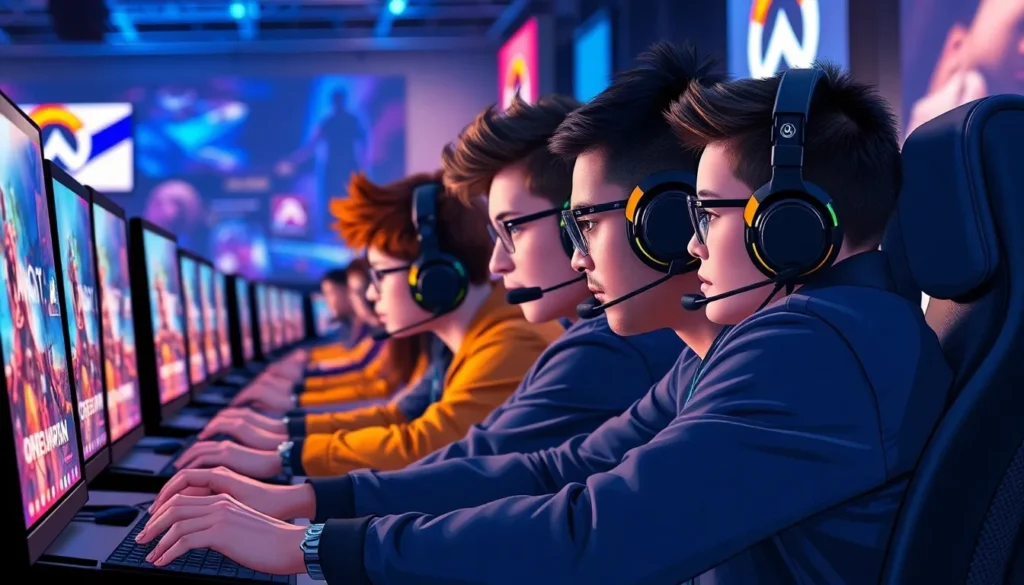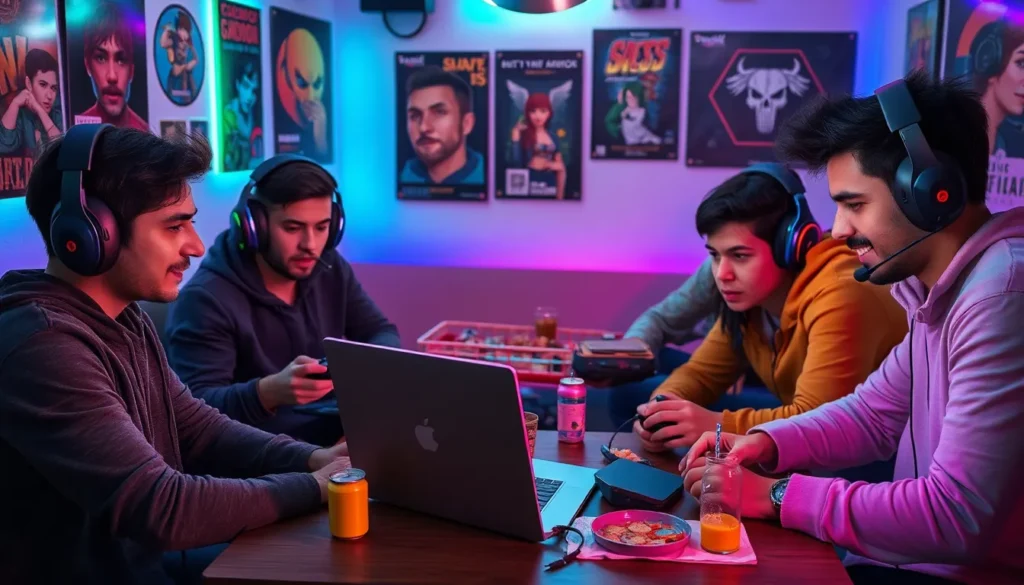Table of Contents
ToggleIn the vibrant world of Overwatch esports, teams battle it out like superheroes in a comic book, each vying for glory and a hefty prize pool. With a roster of unique heroes and strategies that could make even the most seasoned gamers sweat, these teams are more than just groups of players—they’re a force to be reckoned with.
Overview of Overwatch Esports Teams
Overwatch esports teams compete on a global scale, showcasing skill and teamwork. Each team, from established organizations to emerging squads, possesses unique strengths and strategies. The Overwatch League features premier teams like the San Francisco Shock and Seoul Dynasty, recognized for their high-level gameplay.
Focus shifts to the players, as each individual contributes to the team’s success through specialized roles, such as damage dealers and support. Coordination among these players creates intricate strategies that often redefine the competitive landscape.
Team composition plays a critical role in competition. For instance, some teams favor dive comps, while others excel with bunker strategies. Adaptability becomes essential as varied team compositions can influence the outcome of matches.
Prize pools attract top talent and fans alike. The league offers substantial monetary rewards, often exceeding $5 million per season. Teams invest significantly in training facilities, coaching staff, and player development to gain a competitive edge.
Fans engage deeply with their favorite teams through social media and live events. Community connections enhance team loyalty and provide platforms for team brands to flourish.
Consistency remains vital in Overwatch esports. Teams continuously analyze gameplay, making adjustments based on opponents and meta shifts. These practices ensure they stay competitive throughout the ever-evolving season.
Many teams participate in various tournaments, expanding their reach beyond the league. International competitions, such as the Overwatch World Cup, allow teams to represent their countries and gain recognition on a wider stage.
Overall, Overwatch esports teams contribute to a vibrant community filled with excitement, competition, and camaraderie.
Major Overwatch Esports Teams

These teams represent the pinnacle of Overwatch competition. Each has unique qualities that elevate their performance.
Team Composition and Strategy
Players specialize in distinct roles, such as damage, tank, and support. Teams coordinate strategies tailored to their strengths, utilizing dive compositions or bunker setups. Adaptability proves essential during matches, allowing teams to pivot based on their opponents’ tactics. Coaches play a crucial role in developing game plans that maximize player abilities. Synchronized teamwork often determines match outcomes, showcasing the necessity of collaboration.
Notable Achievements
Numerous Overwatch esports teams have secured impressive victories in major tournaments. For instance, the San Francisco Shock claimed multiple Overwatch League championships, underlining its dominance. Teams like the Seoul Dynasty are known for outstanding performances in international competitions. Prize pools have consistently reached more than $5 million each season, incentivizing teams to push their limits. Throughout their journeys, these teams have amassed significant fan bases, further solidifying their status in the esports landscape.
Impact of Overwatch League
The Overwatch League influences the competitive scene and elevates the status of esports globally. It introduces a formal structure that attracts various teams and fans, enhancing engagement across multiple regions.
Structure of the League
The Overwatch League organizes teams into divisions based on geography, fostering regional rivalries. This structure supports a regular season format featuring 20 teams, each competing for playoff spots. A set number of matches occurs during the season, culminating in a championship determined by a double-elimination bracket. The league operates on a strict schedule, allowing fans to follow their favorite teams consistently. Teams undergo a mix of home and away games, promoting local fan engagement and substantial viewership opportunities.
Key Teams to Watch
Several teams exemplify excellence in the Overwatch League, standing out for their skills and strategic prowess. The San Francisco Shock, with multiple championships, consistently showcases top-tier gameplay. Notably, the Seoul Dynasty attracts attention through international success and innovative strategies. Teams like Atlanta Reign and Dallas Fuel also make significant impacts, featuring strong rosters and dynamic gameplay styles. Emerging teams, including Vancouver Titans, continue to surprise audiences with unexpected performances. Each of these teams contributes to an ever-evolving competitive landscape, creating thrilling matchups and compelling storylines.
Challenges Faced by Esports Teams
Esports teams face numerous challenges that impact their performance in the competitive Overwatch scene. Maintaining consistency proves difficult, especially when teams encounter various play styles and strategies. Analyzing opponents and adapting strategies requires substantial effort and resources.
Coaches often struggle to assemble a balanced roster amidst roster changes and player transfers. Retaining top talent is a priority, but high competition can lead players to seek opportunities elsewhere. Financial pressures also play a role as teams invest heavily in facilities, staff, and player salaries while balancing sponsorship deals.
Mental health remains a significant concern within the esports community. Players deal with intense pressure during tournaments, resulting in burnout if not managed properly. Establishing work-life balance often becomes paramount for maintaining peak performance.
Communication is another challenge teams face during matches, especially when under pressure. Miscommunication can lead to costly mistakes, impacting match outcomes significantly. Developing effective communication strategies among players is crucial for cohesive teamwork.
Furthermore, the evolving meta requires teams to constantly refine their strategies and adapt hero compositions. Teams that fail to keep up with changes in game mechanics can fall behind their competition. Embracing innovation and flexibility ensures that teams remain competitive in a fast-paced environment.
Finally, aligning marketing efforts with fan engagement can challenge organizations. Building a loyal fan base involves more than just winning matches. Teams must actively engage with fans through social media, events, and unique content to cultivate loyalty and expand their reach.
The Future of Overwatch Esports Teams
Growth in Overwatch esports teams shows no signs of slowing down. Just last year, teams secured higher prize pools than ever before, with many competitions surpassing the $5 million mark. Success in these tournaments attracts skilled players, allowing teams to invest in their development and facilities.
Emerging teams continue to surprise audiences with innovative strategies. Insights from past tournaments demonstrate that established organizations, like the San Francisco Shock, maintain a competitive edge by adapting to gameplay changes. Regional rivalries evolve through the Overwatch League, fostering fan engagement and loyalty.
Player roles and teamwork remain critical for success. Damage dealers, tanks, and support players must coordinate effectively, as both strategy and team composition influence match outcomes. Adaptive strategies, such as dive and bunker compositions, increase a team’s chances against varied opponents.
Coaches enhance team performance by creating tailored game plans. They emphasize critical analysis of gameplay to identify improvement areas. Managing mental health is also crucial; burnout remains a prevalent issue due to the pressure of high-stakes tournaments.
Audience interaction has transformed the esports landscape. Fans engage through social media and live events, strengthening their connection with teams. This engagement leads to heightened loyalty, resulting in more substantial support during competitions.
Future challenges include roster stability and effective communication. Keeping top talent amid financial pressures necessitates strategic management. Those teams that embrace innovation, foster communications, and adapt to the competitive environment will likely lead the charge in Overwatch esports.
The Overwatch esports scene is a thrilling blend of strategy and teamwork that captivates audiences worldwide. As teams navigate the complexities of competition they continue to evolve and adapt to maintain their competitive edge. The dedication of players and coaches alike plays a pivotal role in shaping the future of the game.
With substantial prize pools and a growing fan base the excitement surrounding Overwatch esports is only set to increase. Emerging teams are pushing boundaries while established organizations strive to uphold their legacies. This dynamic environment promises a bright future for Overwatch esports teams as they continue to inspire both players and fans.







